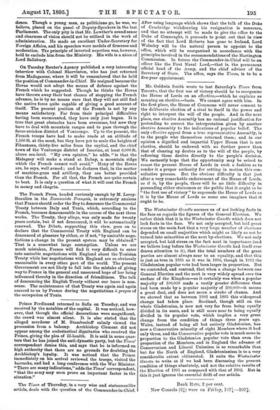The Westminster Gazette accuses us of not looking facts in
the face as regards the figures of the General Election. Wo rather think that it is the Westminster Gazette which does not look facts in the face. We not only accepted, but laid great stress on the main fact that a very large number of elections depended on small majorities which might as likely as not be turned into minorities at the next by-elections. We not only accepted, but laid stress on the fact next in importance (and we believe long before the Westminster Gazette had itself ever drawn attention to it), that the total numbers of the great parties are almost always near to an equality, and that this is just as true in 1895 as it was in 1886, though in 1892 the Gladstonian popular vote had been larger in proportion. But we contended, and contend, that when a change between one General Election and the next is very widely spread over the surface of the Kingdom—as it certainly was when a popular majority of 100,000 made a vastly greater difference than had been made by a popular majority of 200,000—it means a great deal, and does not mean a stroke of chance. And we showed that as between 1892 and 1895 this widespread change had taken place. Scotland, though still on the whole Gladstonian, is now not very far from being equally divided in its seats, and is still more near to being equally divided in its popular vote, which implies a very great change from the condition of things three years ago. Wales, instead of being all but entirely Gladstonian, has now a Conservative minority of eight Members where it had only three, and the Conservative popular vote is much more in proportion to the Gladstonian popular vote than even the proportion of the Members, and in England the advance of Conservatism and Liberal Unionism is so remarkable that but for the North of England, Gladstonianism is to a very considerable extent obliterated. It suits the Westminster Gazette to write as if we had been discussing the present condition of things absolutely, and not the relative results of the Election of 1895 as compared with that of 1892. But in this it just ignores the essential drift of our article.


































 Previous page
Previous page